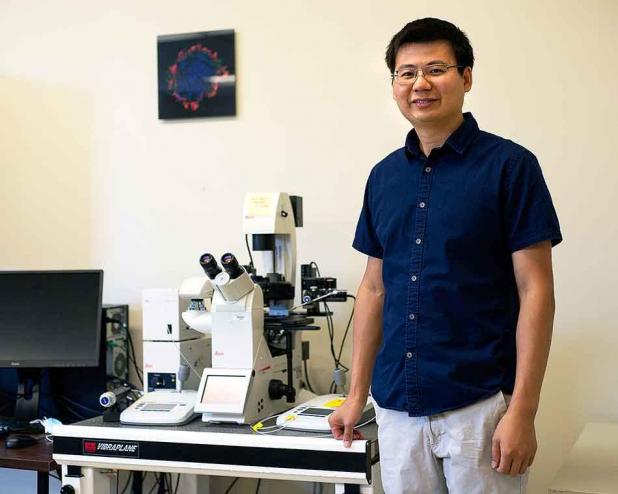
LSU AgCenter researcher Carl Jiang, who is part of a team working on a $3.2 million grant project focusing on placenta development, is pictured in his lab on the LSU campus. The research includes large animals and humans.
—LSU AgCenter/Olivia McClure
LSU researches placenta's roll in early pregnancy loss
BATON ROUGE — As part of a $3.2 million grant project, LSU AgCenter researcher Zongliang “Carl” Jiang is studying the molecular mechanisms that regulate placenta development — and what role they play in early pregnancy loss — in both large animals and humans.
Jiang, an assistant professor in the AgCenter School of Animal Sciences, and his collaborators received the National Institutes of Health grant last year. The project will last for five years.
Jiang is focusing on the placenta trophoblasts, which provide nutrients to the embryo or fetus and facilitate communication between it and the mother. Abnormalities of the placenta can lead to pregnancy complications or loss.
“Much of the reproductive inefficiency observed in animals and humans can be traced back to the placenta,” Jiang said. “Yet the placenta is seriously underappreciated.”
He wants to learn more about DNA methylation — an epigenetic mechanism used by cells to control gene expression — of a substance called N6-adenine, or N6-mA, that is present in mammalian genomes.
In a previously published paper, Jiang and his collaborators demonstrated the important function of N6-mA in early embryogenesis using a mice model. Deficiencies of this substance in mice resulted in pregnancy loss, he said, due to placental development problems.
In the new NIH-funded study, Jiang plans to dissect the role of N6-mA in trophoblasts in large animals such as cattle as well as humans. He also hopes to identify ways to regulate the amount of N6-mA.
“We’re trying to manipulate N6-mA during placental development and see what the effect is,” he said. “Can we remove it or add it at specific regions using enzymes to improve outcomes?”
“Once we understand the mechanisms required for normal placental development,” he added, “we should be able to identify the molecular causes of different conditions that affect the placenta — for example, preeclampsia. That’s a future research area.”
He hopes this research will eventually lead to new treatment options that can correct placental abnormalities and allow embryos to grow normally. These efforts could offer many benefits not only to those in the animal agriculture industry, but also to people of all walks of life.
“Part of our mission at the AgCenter is to improve animal health, and human health is also part of our mission,” he said. “For this project, embryonic loss and early pregnancy loss is a big deal in animals. And in humans, it is the same.”
Working on the project with Jiang are a group led by Andrew Xiao at the Yale School of Medicine, R. Michael Roberts at the University of Missouri and Kenneth Bondioli at the LSU AgCenter.
